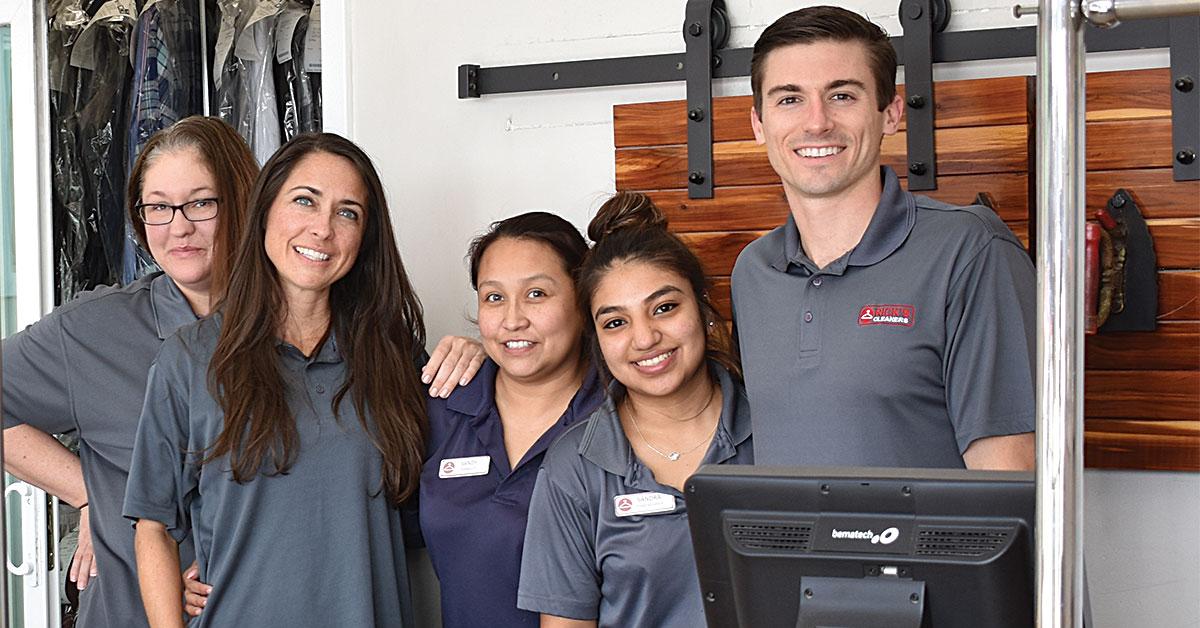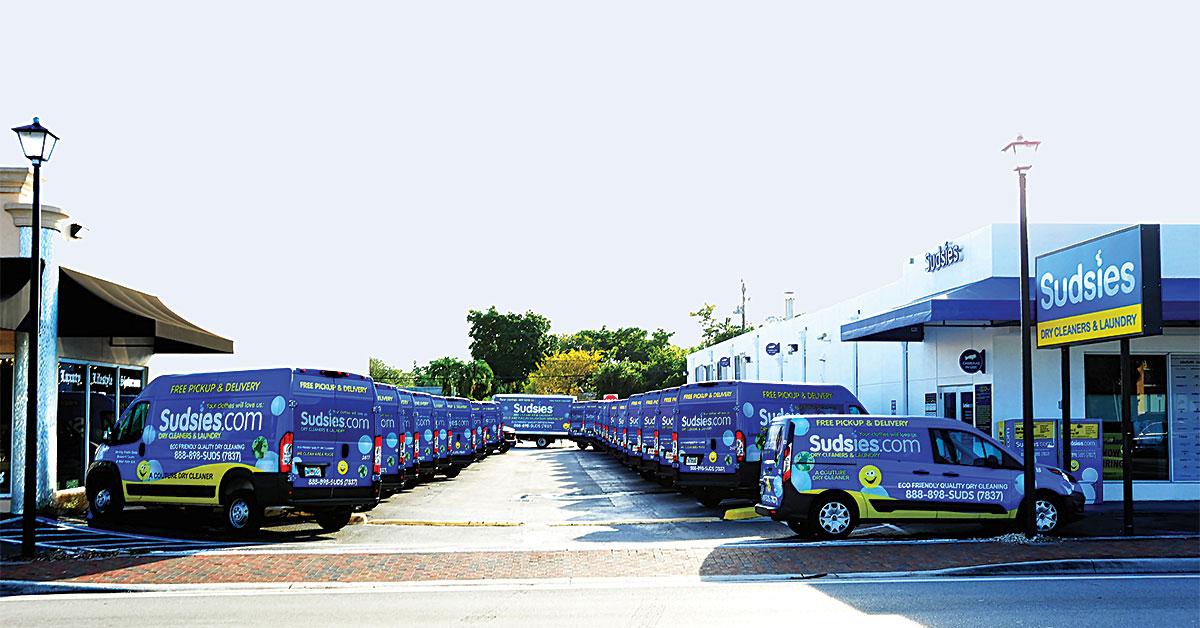CHICAGO — “At the most fundamental level, we use our fabricare point of sale system, or POS for short, to make the operation tick,” says Ian Noble.
“I am the owner of Rick’s Cleaners in Austin, Texas. Rick’s has 16 locations with four plants and specializes in one-price dry cleaning and in providing a great value for our customer,” he notes.
“Your boiler is the heart of your plant; your POS should be the heart of your store transactions and data,” Noble says.
“We utilize a pre-pay model at our store and an automated assembly conveyer from GMS to assemble items at our plant. Six of the 16 stores use bar-codes, and the other 10 use paper tags,” he says.
He plans on converting all his stores to bar-coding. “This allows for accurate mark-in, efficient tracking, and using customer data we never had before. It also reduces plant labor and allows for a smoother running plant.”
“POS should allow your company to be flexible and work ‘within’ your operation,” says Mark Jones, vice president of opertions at SPOT Business Systems based in Draper, Utah. “Software should not force your operation to work a specific way,” Jones notes. “If POS software is based on a single store and you attempt to scale you will run into issues such as reporting, time clock, production and other processes.”
Noble shares: “The two best things about using a POS are speed and data. I had converted from using paper tickets in 2011 and it was a game-changer.
“To help our staff know who they are dealing with, our POS currently places stars on the invoices of the top 50 customers in each store so our staff can always know who our VIP customers are. This changes as consumer spending increases or decreases,” he says.
A basic feature of all POS systems, Noble points out, is to be able to track how much a customer has spent with you.
“Beyond the dollar amount,” he relates, “you can easily dig deeper into their habits. We like to run reports of our top customers who’ve ‘Dropped From The Top’ to compare their spending in the last 90 days to 90 days prior.
“The report will compare the totals of the two date ranges as well as the last visit date so you can determine whether or not you have lost a customer. If we know or even think they may have moved on we call them personally to ask about their experience, see how we can improve, and thank them for their patronage.”
Noble says this has helped them understand why people leave for a competitor.
The benefit, he says, is that: “It has helped us gain back customers who had an issue with us but never told us about it until we reached out to them in efforts to earn their business back.”
“Multiple price lists can be set if you want to price locations or customers differently,” Noble relates, adding that another, “Simple, yet powerful, feature is pop-up notifications alerting our staff of the customer’s history or preferences.”
“A POS system can allow dry cleaners to connect with their customers as never before,” says Brian Athens, senior systems engineer at Fabricare Systems located in Acworth, Ga., adding that, “Texting and emailing are the things customers like about their POS,” Athens relates. “Letting a customer know there is a problem or question with their garments or that the garments are ready, really makes the connection.”
Athens says: “We are always making changes to accommodate our customers. Requests are something we take seriously. Example, we have new customers that have requested merging customers and moving inventory between locations. That’s a game-changer for cleaners.”
Back to Noble’s customer preferences, he gives this example: “If you’ve double-creased a customers’ pants and he has written a negative Yelp review for it, then next time he comes in our staff will receive notifications to triple-check his pants before they get back to him to avoid further frustration for the customer.”
Noble notes: “Your POS can also be used to anticipate staffing for the next day in production by viewing piece counts, or view trends that allow you to reduce hours in your store.”
He adds: “If your employee says they stayed two hours late because they got slammed with customer drop-offs right before closing, there is a report for that. Nearly every step of the process can be tracked, data-mined, and verified, which is very powerful for an owner or operator.”
Noble describes himself as, “A hands-on owner who is extremely involved in day-to-day operations.” He also points out that, “Rick’s was awarded the 2018 Best Dry Cleaners in Austin. It’s our ninth time to win, and we are a back-to-back winner.”
But Noble isn’t the only one talking about POS tech making a business tick today. Others weigh-in.
CHANNELS
POS is more than a revenue system. Think of it as communications channels for drycleaning operators.
Enter Jason Loeb, CEO, Sudsies, Miami, Fla., who says: “Software is an integral part of our business and our future. It is constantly changing.
“The software helps us mange production, communicate with our clients, communicate with each other, manage our systems, set expectations and because this all works together this will help us continue to grow,” he notes, adding that his POS system, “Speaks to our clients via text messaging and or e-mail.”
Loeb relates that he created Sudsies 21 years ago: “I am the current chief executive officer. We specialize in pickup and delivery services all over Dade, Broward and Palm Beach counties.” His business, he notes, has three boutiques and 30 pickup and delivery vehicles.
How is your POS?
“We are using fiber connections at our locations which gives us a consistent upload and download speed,” Loeb says. “Cloud-based also works much faster than even having a traditional server on location. And we are constantly being backed-up.”
Loeb also says that he and his team received on-site training, and notes: “We found training to be very simple. The software is intuitive and smart. The team was training other team members by the end of the day. When purchasing software take into account how you will be training your teams.”
Training in this tech means investing in both the present and the future, and that seems to spell POS.
“Like all industries, technology is changing the way we can do business,” notes Joanna Creed, president of Toronto, Canada-based Pivot IO, a company which makes a POS system she describes as “built to streamline business operations at the point of purchase.”
She says: “POS software has changed significantly over the last decade from something that was only available as an on-premise solution for large enterprises with deep pockets.
“Nowadays, you have a host of POS systems that are pretty much plug-and-play right out of the proverbial box. For small businesses like dry cleaners, it doesn’t get much better than that.”
Creed points out that: “As a former drycleaner myself, our mission as a company, is to make your cleaning business simpler and more productive.”
She indicates that POS systems, “Not only get you through your day-to-day operations but also help drive you into the future.”
Technology advancements, Creed notes, “Don’t only affect consumer experience, but also the operations of the company itself. Certain uses of a POS system are obvious, such as taking in customer orders; detailing garment mark-in; and accepting payment.
“However,” Creed adds, “there is a lot more to a POS system that makes it a worthwhile investment for a drycleaning business.”
For instance, she says, “POS collects customer data, sends invoices, tracks piece counts, manages corporate accounts, ensures consistent pricing, and keeps track of business performance. Without a POS system, owners are left guessing what’s going on in their business.
“A POS system,” Creed insists, “allows you to have access to information about your business so you can make informed decisions. It helps owners determine why customer habits are changing and how to market to your customers.”
Creed’s own business is a cloud-based POS system. She says: “Cloud-based systems are generally replacing traditional systems because of, among other things, the ease of remote access, seamless product updating, data security and recovery, and functionality across devices.”
There are certainly other companies serving the drycleaning industry and helping change the game with POS system advances.
One of those is Cleaner Business Systems in Burnsville, Minn. Tim Woodman, senior sales manager says this: “A point of sale system gives dry cleaning owners, whether they have one location or multiple locations, more control over their business in the areas of cash control, detailed reporting, and time savings.”
“Also” he adds, “it provides the ability to manage multiple locations from almost anywhere.”
Another one of those firms helping to make this evolving POS tech continue ticking upward, is garment care software firm Starchup, based in Brooklyn, N.Y.
This company’s platform, notes Nick Chapleau, CEO and co-founder, “Includes: POS, customer relationship management (CRM), plus customer-facing mobile and web apps and an integrated marketing solution. We automate your garment care business so you can do more for less.”
What POS functions do drycleaning owners find particularly handy?
The answer from Chapleau comes simply and directly: “Variety.” Meaning all the different types of customer-communication options.
He says his firm, “Enables automated text messages and e-mails to inform customers about the order process, and to re-market services and promotions.”
Chapleau notes that, “Item tracking enables our customers to track down the last employee who handled a given garment to avoid misplaced pieces or match a found garment to an order.”
In general, does a POS system, ultimately, help make a drycleaning business more money?
Chapleau says: “A good software platform will increase annual margins by thousands of dollars per store.” Chapleau points out that his firm’s integrated marketing platform — CRM, e-mail, digital marketing, and ordering apps — helps to acquire new customers using state of the art tools, noting his company’s, “Retention tools and customer communication features help to retain and increase revenue from existing customers.”
At CleanCloud, based in London, England, co-founder and CEO John Buni, describes his company as, “Cloud-based point of sale and delivery management solution, powering dry cleaners in over 55 countries worldwide.”
How does a POS system work in a drycleaning operation beyond revenue transactions?
Buni explains: “It works in a number of different ways. First, it allows drycleaning operators to have access to customer information in real-time and in multiple stores. This improves customer service across the board.
“If someone walks into store A or store B, the person serving that customer has the relevant information at hand and can give them more personalized service,” he notes.
If your POS system is cloud-based, Buni points out, “Then staff members at drycleaning operations have access to up-to-date order information as the piece of clothing gets moved on thru different departments.
“In other words, if someone comes in and drops off clothes for dry cleaning and alterations at the same time, then a good cloud-based POS system will allow the business to know where those items of clothing are, and to keep the customer updated through e-mail,” Buni says.
What we’re hearing is that POS systems can help a drycleaning business: to be more efficient; to help an owner know more about their clients; to know things in an up-to-date way; and to help an owner be profitable.
What about when an owner looks into buying a POS system? What tips can we learn?
Check back Thursday for the conclusion.
Have a question or comment? E-mail our editor Dave Davis at [email protected].


